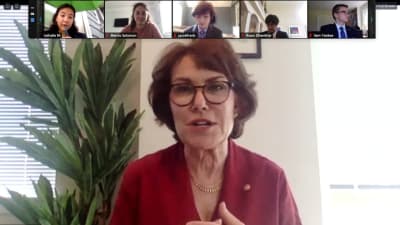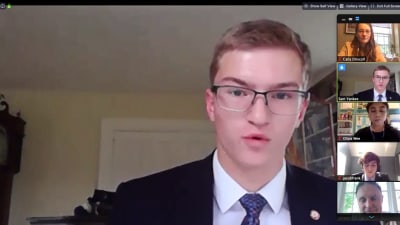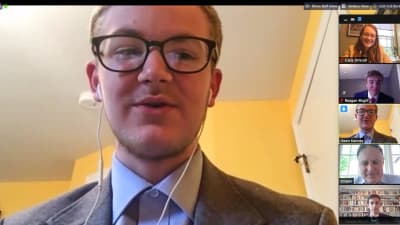Senators, Congresswomen, and Governors
Each semester we leave room for speakers who do not fit neatly into one of our weekly case studies. Some of these sessions blossom into popular new case studies (our Spring 2010 meeting with Lissa Muscatine, for example), and some become the stuff of SEGL legend (President Barack Obama in Summer 2017).
In the second half of the Spring 2020 semester we’ve had more than the usual number of these speakers, in part to bring special energy to our online platform. Here are a few:
- Former U.S. Senator and Governor of Indiana Evan Bayh met us from his kitchen, where he answered questions about his public service, leadership philosophy, and the COVID-19 pandemic. Many students asked him about the recent friction between the federal and state governments: which is handling the crisis better, and why? What might he have done differently if he had been in the Senate or Governor? One student noted that he was nearly chosen as Barack Obama’s running mate in 2008 and wondered what criteria Joe Biden (the man selected instead of Bayh) should be using today.
- Longtime Congresswoman and current President of the Woodrow Wilson Center Jane Harman met us from her living room. Harman’s no-nonsense charm was a particular hit with our students, who asked questions about Congressional partisanship, the Israeli-Palestinian Conflict, being a mother in Congress, and more.
- U.S. Senator Jackie Rosen joined us from her Nevada quarantine. She answered questions about serving on the Presidential task force on reopening the country (how does she work across party lines?), the bipartisan HERO Act (which she and a Republican colleague introduced), the rise of anti-Semitism around the world (Rosen is Jewish), and how her STEM background influences her political work.
- We also make the most of a 30-minute phone call with Senate Minority Whip Dick Durbin, who packed many answers into his shorter session. Our students asked questions about doing unpopular things that are for the public good, his tough decision on “partial birth abortion,” his mixed feelings–as an Intelligence Committee member–on keeping what he knew about Iraq’s alleged WMD program from the American public, and more.
Each of these leaders added wisdom and perspective, not only to our academic deliberations, but to each student’s understanding of how to persevere and thrive amidst the current crisis.




















